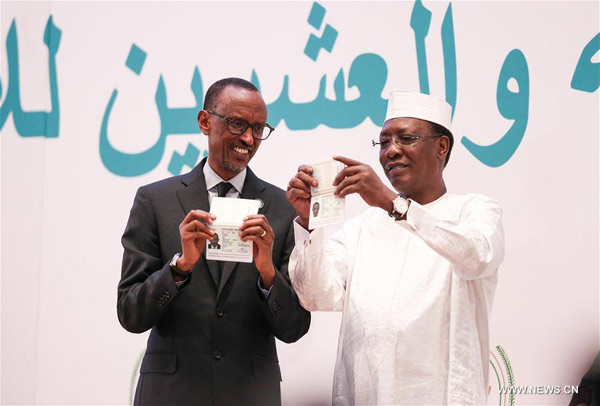African Union opens with launch of continental passport
 |
|
Rotating African Union chairperson Idriss Deby (R), President of the Republic of Chad, and President of Rwanda Paul Kagame show the continent's first-ever African e-passports at the opening ceremony of the 27th ordinary session of the AU Heads of States in Kigali, capital of Rwanda, on July 17, 2016. [Photo/Xinhua] |
The 27th ordinary session of the Assembly of Heads of State of the African Union (AU) opened on Sunday with the launch of a continental passport that will allow citizens of the 54 member states to travel visa-free in the continent.
The first printed passports were given to the host president, Rwanda's Paul Kagame, and his counterpart, Idress Deby of the Republic of Chad, who is also the AU chair.
While presenting them, Nkosazana Dlamini Zuma, the chair of the AU commission, called on member states to accelerate ratification of the new passport policy to ensure citizens have access to the document. She also congratulated the presidents on their landmark decision to develop mechanisms to finance the pan-African organization.
"You took an unprecedented leap forward for African self-reliance and dignity. We congratulate you for this bold and visionary leadership that you have shown," said Zuma.
Kagame said Africa should finance AU programs and take urgent steps toward ownership by strengthening its political will. "By falling into routine, it means that we have accepted to be held by our donors. We should reject that," he said.
"We should use this summit to identify our priorities and not be divided in our goals," Kagame told more than 30 heads of state at the Kigali Convention Center.
At least 76 percent of the AU budget is donor funded. A mechanism has been proposed that for member states contribute 0.2 percent of all their imports duties toward the budget that stands at $447 million according to Rwanda finance and economic planning minister Claver Gatete.
This would realize $1.2 billion that would be channeled into 75 percent of AU commission programs and the rest toward peace and security operations.
"Goods that would not be levied are the essentials like medicine, fertilizer and others that are critical to the member state," said Gatete.



























